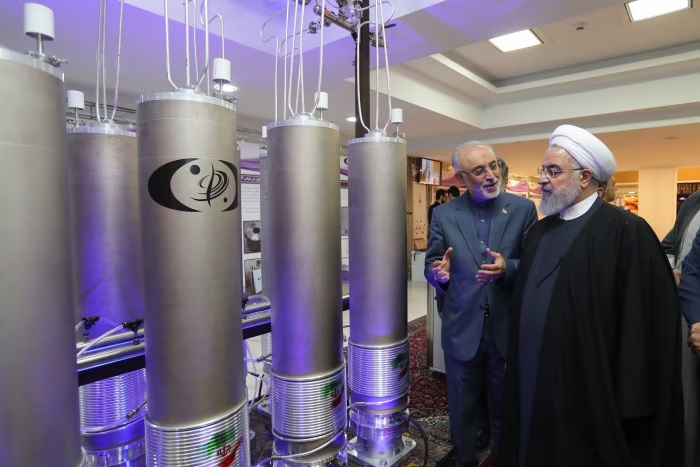Iran has significantly increased its production of highly enriched uranium, according to a confidential report from the International Atomic Energy Agency (IAEA) reviewed by the BBC.
The report reveals that Iran now holds over 400 kilograms of uranium enriched to 60% purity.
This is a level far above what is needed for civilian energy use and dangerously close to weapons-grade enrichment.
This represents an almost 50% increase in just three months.
The amount of uranium now in Iran’s possession could be sufficient to produce approximately 10 nuclear weapons if further refined.
This development makes Iran the only country without nuclear weapons that is enriching uranium to such a high level.
Tehran maintains that its nuclear programme is strictly for peaceful purposes.
However, the IAEA has made it clear that it is unable to confirm whether Iran’s intentions remain peaceful.
According to the report, Iran has been enriching uranium at a pace equivalent to producing enough material for one nuclear weapon each month over the past three months.
This activity has been taking place alongside ongoing negotiations between Iran and the United States aimed at reviving a nuclear agreement.
IAEA Director General Rafael Grossi expressed serious concern.
He stated that “the significantly increased production and accumulation of highly enriched uranium by Iran… is of serious concern.”
The report is expected to prompt the United States, United Kingdom, France, and Germany to push for a formal declaration by the IAEA’s board of governors that Iran is violating its non-proliferation commitments.
Following the release of the IAEA report, Israel accused Iran of being “totally determined” to obtain nuclear weapons.
In a statement issued by Prime Minister Benjamin Netanyahu’s office, Israel argued that “such a level of enrichment exists only in countries actively pursuing nuclear weapons and has no civilian justification whatsoever.”
In response, Iranian Foreign Minister Abbas Araghchi reiterated Tehran’s opposition to nuclear arms.
Speaking in a televised address, he said, “If the issue is nuclear weapons, yes, we too consider this type of weapon unacceptable.”
Araghchi, who is also leading Iran’s negotiations with the U.S., emphasized that Iran shares this view with its critics.
Despite these assurances, U.S. officials estimate that if Iran decided to pursue a nuclear weapon, it could produce weapons-grade uranium in under two weeks and potentially build a bomb within a few months.
The IAEA’s report, which is unusually lengthy and detailed, also raises concerns about Iran’s past nuclear activities.
It concludes that Iran conducted undeclared nuclear work at three previously undisclosed locations: Lavisan-Shian, Varamin, and Turquzabad.
These findings point to a pattern of non-compliance and lack of transparency.
Ongoing nuclear talks between Tehran and Washington began in April and have continued with intermittent progress.
Both sides have voiced optimism.
However, key issues remain unresolved, especially whether Iran will be allowed to continue enriching uranium under any future agreement.
Although Iran continues to assert that its nuclear ambitions are peaceful, the IAEA stated it “cannot verify” this claim.
This uncertainty stems from Iran’s continued refusal to grant IAEA inspectors access to key sites.
Also, it fails to address long-standing questions about its nuclear history.
Two senior advisers to Iran’s Supreme Leader Ayatollah Ali Khamenei – Ali Larijani and Kamal Kharazi, have suggested that Iran could rethink its stance against developing nuclear weapons if international pressure escalates.
These remarks have alarmed Western diplomats.
They fear that Iran may be moving closer to becoming a nuclear threshold state, one that possesses the capability to produce nuclear weapons but has not yet done so.
The IAEA board of governors is expected to convene soon to deliberate on the report and consider next steps.
There is growing pressure on Tehran to fully cooperate with inspections and return to compliance with international nuclear agreements.
Diplomats indicated to Reuters that a formal referral to the United Nations Security Council may not happen immediately.
And on the other hand, the current findings strongly increase the likelihood of such action at a future board meeting.
The global community is watching closely as Iran’s nuclear programme continues to raise alarms over regional and international security.







